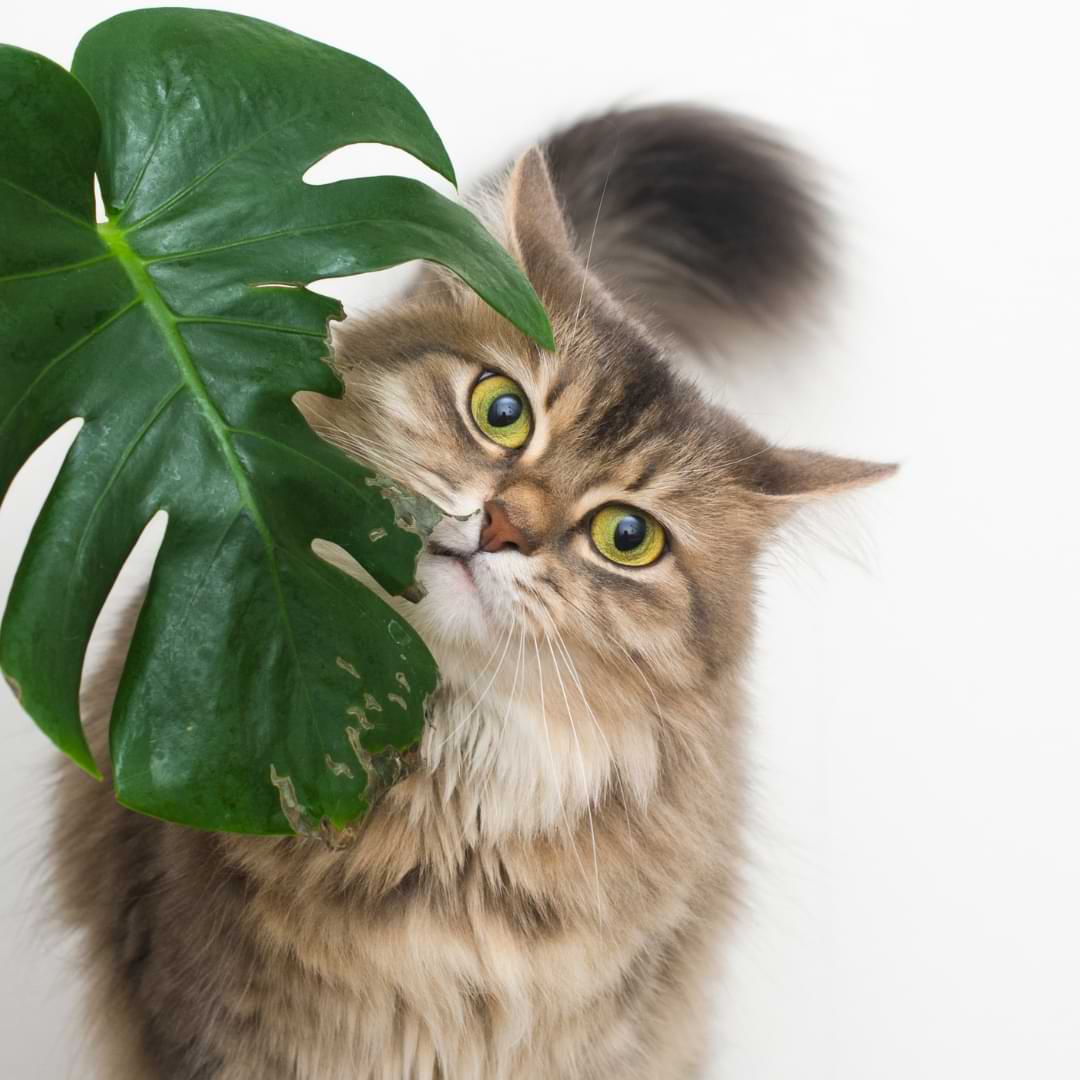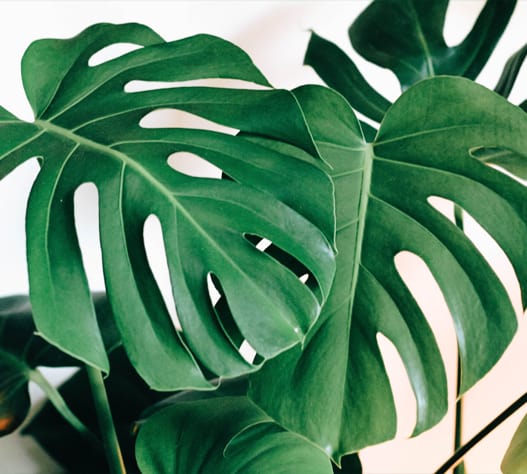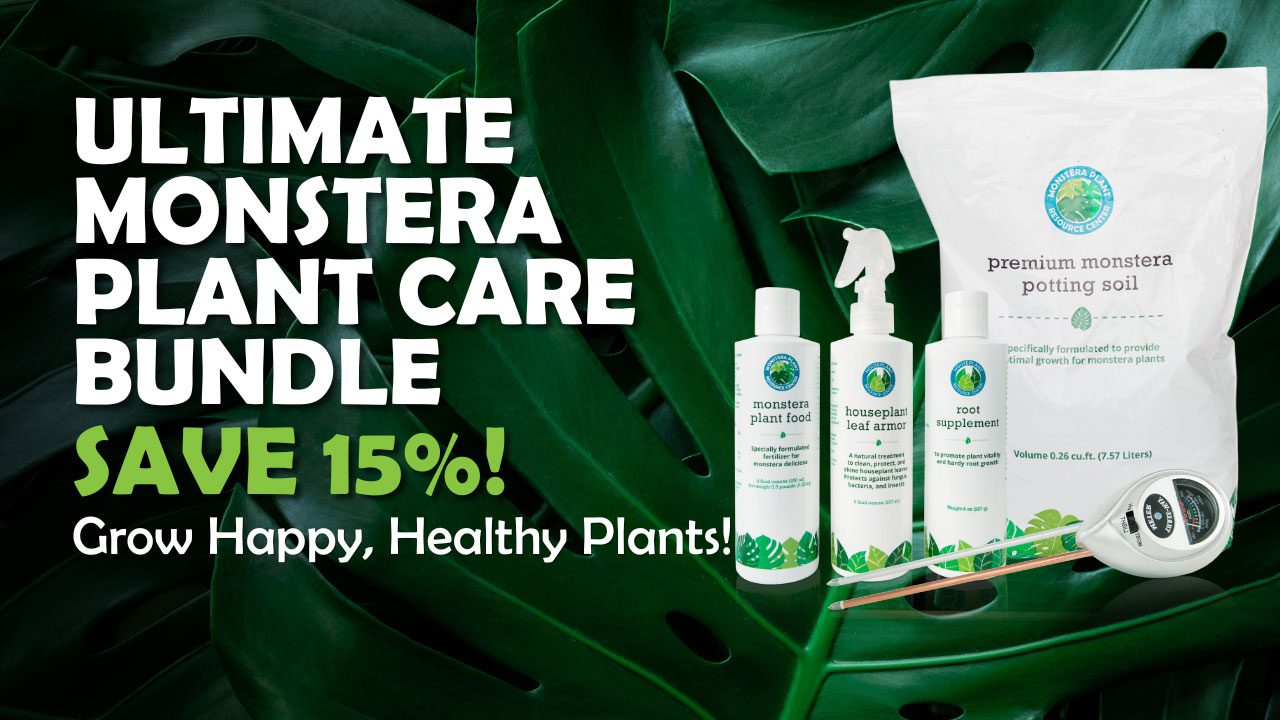“Are monsteras toxic to cats?”
If you’re a cat owner who also loves monstera plants, this question can present quite the challenge.
Bad news: the answer is yes. All monstera species (and most aroids, in fact) are toxic to dogs, cats, and humans.
But just how toxic are monstera plants for cats? Can your monstera and your cat live in the same space so you can have your fluffy friend as well as your gorgeous monstera plant?
In this article, we’ll explore what makes monsteras toxic to cats, as well as steps you can take to keep your cat away from your monstera. That way, you can enjoy your kitty friend and your monstera plant without harm coming to either. It’s possible for cats and houseplants to live together in peace!
Table of Contents
Are Monsteras Dangerous for Cats?
The good news is that monstera plants aren’t deadly to cats (or dogs or humans) in most cases.
If your cat ingests a part of your monstera, it may irritate their mouth, throat, and stomach lining and possibly cause vomiting and drooling; however, your kitty’s life won’t be at risk unless it has eaten very large quantities of the plant. This is rare, though, because the irritation will begin almost immediately after your cat takes a bite out of your monstera, which should discourage it from eating any more.
What Makes Monsteras Unsafe for Cats?
Why are monstera plants such a problem when ingested?
The answer lies in the calcium oxalate crystals that are present in almost all parts of the monstera plant.
Calcium Oxalate Crystals
These tiny particles are composed of oxalate and calcium and are sharp and pointed like a bundle of needles. They can cause irritating micro-cuts in tissue in the mouth, throat, and digestive system, or even become embedded in those tissues. These crystals can also bother your skin, which is why it’s a good idea to wear gloves when you prune your monstera.
The crystals are actually helpful to the monstera plant because they prevent it from being eaten by animals.
The only part of the plant that is meant to be eaten is the fruit, which is perfectly safe when it’s ripe. This allows the plant to disperse its seeds more widely through animals and their digestive systems.
What Part of Monstera Contains Calcium Oxalate Crystals?
Calcium oxalate crystals are present wherever the sap flows, which means it’s in most parts of your monstera, including the stems and leaves, roots, and even the unripe fruit.
To sum it up, all parts of the plant are harmful to your cat, which is why it’s best to keep them far away from your monstera plants!
Symptoms of Calcium Oxalate Crystal Poisoning
If your cat has eaten a part of your monstera plant, the first warning sign you’ll probably notice is your cat pawing at its mouth or face due to oral irritation.
You might also notice swelling in the mouth, lips, or tongue.
In extreme cases, your cat’s throat could also swell, making it difficult for it to breathe. (If this occurs, get them to a vet ASAP.)
Other warning signs include excessive drooling, vomiting, and loss of appetite.
Could Monstera Toxins Kill My Cat?
In almost all cases, no.
Consuming parts of a monstera plant won’t kill a cat unless they are consumed in very large amounts.
Large quantities of calcium oxalate crystals in your cat’s body can potentially damage the kidneys, but this is very rare because those crystals will cause pretty immediate irritation, which usually discourages animals from eating more of the plant.
Still, if your cat eats any part of your monstera plant, it’s a good idea to seek veterinary attention right away.
What to Do if Your Cat Has Been Poisoned
If you think your cat has eaten any part of your monstera plant and you’re noticing signs of irritation or toxicity, call your vet right away, or contact Animal Poison Control at 1-888-426-4436. (Note: This service may charge you for a consultation.)
You will also want to use clean water to rinse your cat’s mouth, eyes, paws, or any body part that has come in contact with the monstera’s sap. Also, encourage your kitty to drink water, which should help flush as many of the crystals as possible from the digestive system.
How to Prevent Cats From Eating Monsteras
So how can you keep your fluffy family members from eating your monstera plant?
The best approach is a combination of limiting access to the plant, distractions, and repellants.
Here are some tricks to keep both your cat and your monstera happy and safe.
Keep Plants Out of Reach
Obviously, this is the most reliable way to keep your cat and your monstera apart, but this can be challenging, especially if your cat is particularly athletic and able to reach high places!
If possible, put your plant out of reach on a shelf that your cat can’t access, or in a hanging basket (for smaller monstera species).
A gate, chicken wire, or another barrier may block access to your plant if your cat is unable to jump the barrier or get behind it.
Other options include keeping the plant in a room that your cat can’t access.
It’s also important to clear away any dropped leaves immediately so your cat doesn’t decide to snack on them!
Cat Deterrents
Deterrents can make your monstera plant less appealing to your cat. They might work by making your monstera smell bad to your cat (but completely fine to you) or by training your cat to associate your plant with undesired consequences.
Water
Spraying cats with water in a squirt bottle is a harmless, simple, and effective method for training them to avoid certain objects or behaviors.
If you notice your cat getting a little too friendly with your monstera plant, quickly squirt them with a jet of water. If you do this consistently, they will begin to associate the plant with the water and avoid that area.
You can use this principle in other ways. For example, you could stack cans near the plant that are easy for your cat to knock over if they get too close, or park the vacuum near your monstera if your cat is afraid of the vacuum. Over time, these measures may make the plant less appealing to your cat, even after you’ve removed the deterrent.
Repellents
Cats hate the smell of citrus fruit, so try placing some lemon, lime, orange, or grapefruit peels in the soil or dabbing a little citrus essential oil on the rim of the pot.
You can also try spraying the plant down with water that contains a little lemon juice. Vinegar and citronella can also discourage your cat from messing with your plant, but you may not like the smell either!
Red pepper and mustard are also great for repelling cats. Mix a few spoonfuls into water and spray it around the plant to keep your kitty away.
You can also keep potted rosemary around your monstera. Cats hate the smell and, as an added bonus, you can use it in your cooking!
If all else fails, Nature’s Miracle also makes a great pet deterrent spray you can spray around the plant to keep your cat away (but avoid spraying it directly on the plant).
Mulching Top Soil
Adding something to the top of the soil that cats don’t like to walk on can keep them from digging up your monstera.
For example, you can add stones, bark, or pine cones to the surface of the soil. Not only will they act as a barrier to make it harder to dig up the soil, cats hate the feeling of these materials under their paws, so they will probably stay out of the soil altogether.
Providing a Distraction
Providing your cat with plenty of attention, toys, and activities can keep them stimulated and entertained so they won’t resort to digging up or snacking on your monstera out of frustration or boredom.
Try providing a wide variety of toys your cat can bat around and chase, visual stimulation such as bird feeders or “kitty TV” videos you can find on YouTube, and tunnels or cat trees your cat can climb and hide in.
Make sure to play with your cat regularly and give them lots of affection. If your cat feels starved for attention, they may engage in behaviors that get your attention by any means possible, even if it’s in a negative way.
You can also try rotating toys to keep things fresh and fun for your furry friend.
Cat-Safe Plants
If this all sounds like too much work and trouble, you may just decide to opt for cat-safe plants so you won’t have to worry if your cat takes a bite out of one of them.
Luckily, there are plenty of beautiful and easy-to-care-for plants that are also non-toxic and cat friendly:
- African violet
- Boston fern
- Burro’s tail
- Calathea
- Christmas cactus
- Cast iron plant
- Echeveria
- Haworthia
- Majesty palm
- Money tree
- Nerve plant
- Parlor palm
- Peperomia
- Pilea
- Polka dot plant
- Ponytail palm
- Prayer plant
- Rattlesnake plant
- Spider plants
You can also plant cat grass, lemon balm, and catnip and keep those plants where your cat can get to them. That way, they might avoid the off-limits plants and stick to the safe, easy-to-reach ones.
Fresh Litter Tray
Oftentimes, cats will get into houseplants—like your brand-new monstera—and use the soil as a litter box. While this can be a behavior problem, it can also mean that your cat is unhappy with the state of its actual litter box!
Make sure to keep your cat’s litter clean and fresh. Scoop it out daily and switch out the litter regularly so things don’t get too funky.
And if your cat seems to have accidents regularly, consider switching the type of litter or even making an appointment with the vet to see if your cat may be suffering from bladder or liver problems that could make urinating painful. If your cat associates the litter box with pain, they may find other places to relieve themselves, like your monstera’s pot!
Are Monsteras Toxic to Cats? Final Thoughts
Monsteras are gorgeous houseplants, but they don’t always mix well with our furry family members.
But it can be done!
These tips can help you keep your cat away from your monstera. And if one strategy doesn’t work, don’t give up! Just try another. Multiple strategies can also be effective, so try providing your cat with plenty of love and other things to play with, keeping the litter clean, and applying deterrents to your plant.
And if you just can’t seem to make it work (or just don’t want to bother with a monstera in a cat-lover household after all), there are plenty of other options for beautiful, cat-friendly houseplants!
For more monstera resources, be sure to check out our helpful community on Facebook!





